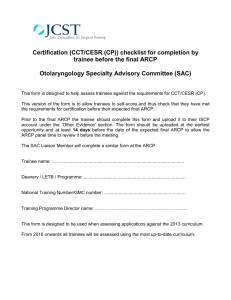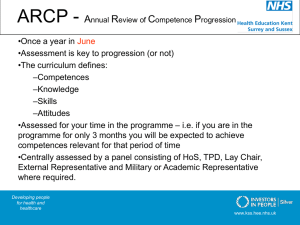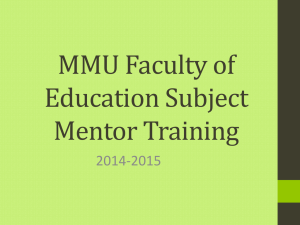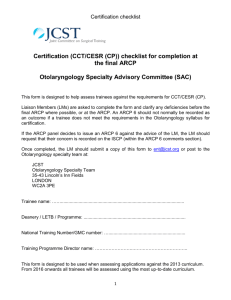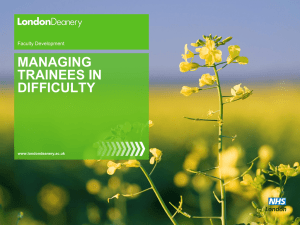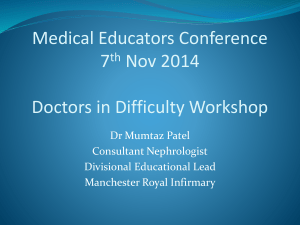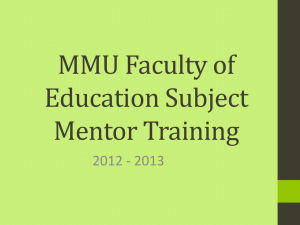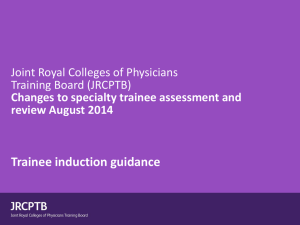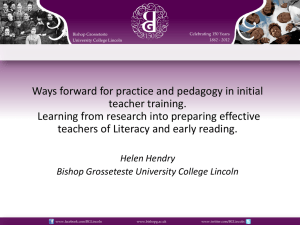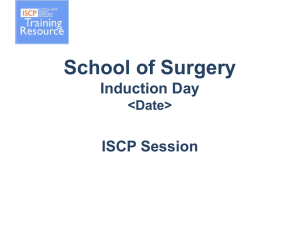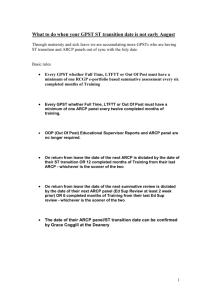Annual planning meeting
advertisement
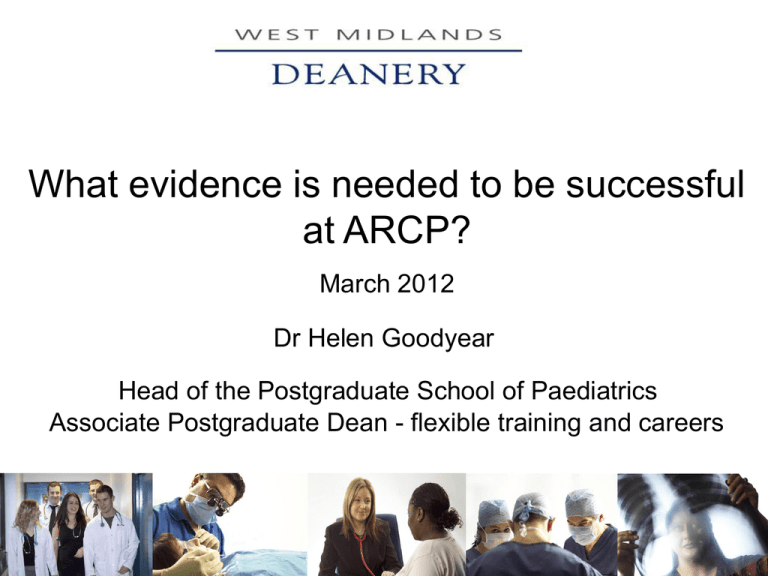
What evidence is needed to be successful at ARCP? March 2012 Dr Helen Goodyear Head of the Postgraduate School of Paediatrics Associate Postgraduate Dean - flexible training and careers What is ARCP • Annual review of competence progression • Each year whether full or part time • Electronic evidence no paper work will be considered What evidence is needed • • • • • • Meetings with educational supervisor Work place based assessments MSF (360 degree assessment) Supervisors reports Completion of all parts of E Portfolio All certificates eg PLS, APLS, NLS safeguarding JEST and GMC trainees survey to be in Personal library Meetings - Paediatric specialty trainees • Induction – – – – – – – – – Within 2 weeks of the start of the post Complete induction meeting on e Portfolio Plan use of assessment tools Discuss problems/ any PDP objectives not achieved in last post Update PDP Career planning including RPCCH membership exams Audit Curriculum Overview of E Portfolio Midpoint meeting • Fill in midpoint review at 3 months • Reviews • • • • • • Attendance at educational sessions Check progress of workplace based assessment tools Has MSF been done? Feedback on performance Sick and study leave, courses (APLS & PLS) Review PDP, reflective learning, curriculum, developmental and skill logs, audit progress, career intentions, MRPCH ,courses End of post meeting • Fill in end of post review – annual review if the end of 12 months • Reviews • • • • • attendance at educational sessions Check right number of WBA tools Feedback including MSF Sick and study leave Review PDP, reflective learning, curriculum, developmental and skill logs, audit progress, career intentions, MRCPCH What forms does your educational supervisor need to fill in • Induction meeting • Midpoint meeting – supervision meeting form • End of post report • The educational supervisor at the end of 12 months needs to fill in the annual review form Workplace based assessments • • • • • Mini-CEXs DOPs TO BE DONE THROUGHOUT THE YEAR AND NOT ALL IN THE LAST CbDs 2 MONTHS PRIOR TO ARCP SAIL CCF YOU MUST HAVE THE MINIMUM NUMBER FOR YOUR YEAR OF TRAINING Minimum number of WBAs per year of training ST1-3 Level one ST4-5 Level two ST6-8 Level three DOPs – listed for each level of training Procedure Code Collection of blood from central lines 01 Umbilical vessel sampling 02 Umbilical Artery cannulation 03 umbilical Venous cannulation 04 Venesection (venous blood sampling) 05 Peripheral venous cannulation 06 Capillary blood sampling 07 Suprapubic aspiration of urine 08 Urethral catheterisation 09 Electrocardiogram (ECG) 10 Non-invasive blood pressure measurement 11 Lumbar puncture 12 Bag, valve and mask ventilation 13 External chest compression 14 Tracheal intubation of term newborn babies 15 Peripheral arterial cannulation 16 Perform basic lung function tests 17 Administer intradermal injections 18 Administer subcutaneous injections 19 Administer intramuscular injections 20 Administer intravenous injections 21 Percutaneous long-line insertion 22 Needle thoracocentesis for pleural effusion or pneumothorax 23 Intubation of newborn infants of most gestations 24 Administration of surfactant 25 Insertion of intraosseous needle 26 Who can I choose as an assessor? • MiniCEX - an experienced higher level trainee or consultant. Not ST4 for ST3 trainee • CbD - consultant • DOPS - senior nurse, experienced higher level trainee or consultant • ePaedMSF (formerly eSPRAT) - a variety of assessors; senior nurse, experienced higher level trainee, consultant, junior nurse, junior trainee, trainee of equivalent training level, administrative staff MSF (360 degree assessment) • The RCPCH Assessment Strategy requires one satisfactory ePaedMSF per training year • Ensure you do self rating on e SPRAT • Deanery policy is 1 MSF per 6 months - so 1 TAB as well – 12 raters to include Consultants, nursing staff, peers, junior colleagues, wardclerks/secretaries • Educational Supervisor will make feedback available to you E Portfolio • Complete the curriculum . Must achieve – level 1 competencies in ST1-3 – level 2 in ST4-5 – level 3 in ST6-8 • Skills log • Developmental and skills logs • PDP • Remember to share what you have put in otherwise we will not be able to access it for your ARCP Curriculum • Fill in the generic and specialty curriculum for the appropriate level of training • Link to evidence – not enough just to rate yourself as competent Developmental log • • • • • • • • • • Certified courses Clinical questions Relections/critical incidents Educational meetings/CPD Teaching/presentations Governance including audit Research Child protection Management Clinics ALL NEED TO BE FILLED IN Skills log • • • • • Airways and respiratory Circulation Diagnostic procedures Neonatal procedures Subspecialty procedures Skills log • A DOPS means you can do a procedure on one day in one child • Skills log needs to show you are competent – so collect several venepunctures in a range of children, several intubations etc PDP • Remember to keep up to date • Each objective needs a new line – do not put all together ARCP process • Not an assessment of the trainee but of the documentation and submitted evidence presented by the trainee • Trainees do not attend the panel unless an unsatisfactory outcome is anticipated • If unsatisfactory outcome, all trainees are invited to attend a subsequent face to face meeting ARCPs • July 2012 • ARCP face to face meetings September for those with outcome other than 1 ARCP outcomes Satisfactory Progress 1. Achieving progress and competences at the expected rate (clinical) Achieving progress and competences at the expected rate (academic) Unsatisfactory or insufficient evidence (trainee must meet with panel) 2. Development of specific competences required - additional training time not required 3. Inadequate progress by the trainee - additional training time required 4. Released from training programme with or without specified competences Released from academic programme 5. Incomplete evidence presented - additional training time may be required Recommendation for completion of training 6. Gained all required competences (clinical) Gained all required competences (academic) Outcomes for trainees out of programme or not in run-through training 7. Out of programme experience for approved clinical experience, research of career break 8 .Fixed-term specialty outcome - competences achieved identified above Annual planning meeting • Face to face meeting to discuss your career • Currently being held in April/May prior to ARCPs • Led by Head of School/Programme director/Regional advisor • 2 other consultants per panel • Chance to “take stock” and look at career • Feedback on posts • Essential for those going out of programme/National grid/not able to complete all competencies Annual planning meetings • They are booked on line • http://www.westmidlandsdeanery.nhs.uk/Spe cialtySchools/PostgraduateSchoolofPaediatrics /UpcomingCourses.aspx • Link is active – NB you will need to scroll down courses page START • Specialty Trainee Assessment of Readiness for Tenure, formerly ST7 • All trainees entering level 3 (ST6) on or after 1 August 2011 compulsory for CCT • Cost £850 • 9-10th November 2012, 14th & 15th March 2013 • RCGP Assessment Centre in Euston • http://www.rcpch.ac.uk/start ARCP Summary • ARCP is an electronic review of the Portfolio of evidence for ST1-8 trainees • It depends on you building up that evidence over a one year period.
